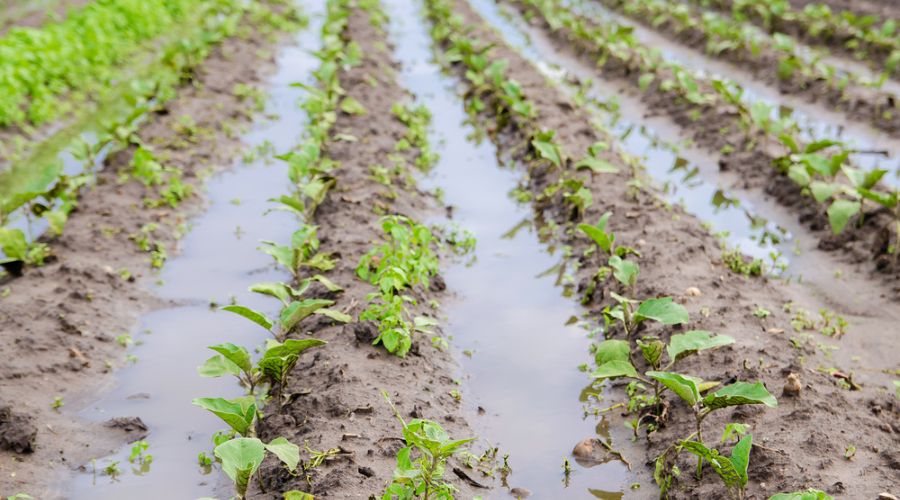Fresh calls for action on food security as drastic crop reduction is forecast
22nd March 2024
The UK government has been urged to deliver for UK food security as a drastic reduction in crops is expected due to wet weather.

A survey by the AHDB has shown that yields of crops such as wheat, winter barley, and oilseed rape are likely to be significantly reduced this year due to the wet weather.
The AHDB survey revealed:
· Wheat – down 15% at 1.463 million hectares (biggest reduction in cropped areas since 2020)
· Oilseed rape – down 28% at 280,000 hectares (biggest reduction since 1980s)
· Winter barley – down 22% at 355,000 hectares (biggest reduction since 2020).
Helen Plant, AHDB senior analyst, said that the next few weeks will be crucial for arable farmers, and the wheat reduction could be greater, depending on the planting of spring wheat.

Ms Plant added: “Farmers still have the chance to plant crops such as spring barley and oats – but if heavy rain continues, crops will be planted at a point where they may become economically unviable.
“We are heading to the point where spring-sown winter wheat varieties will not be able to develop sufficiently to provide a viable crop.
“There is a clear intention to plant more spring wheat, but the persistence of wet weather means there is uncertainty about whether this can be done.
“While the area of spring wheat is small in comparison to the total wheat area, any areas that can’t be planted would further reduce the total wheat area.”
The AHDB senior analyst explained that all parts of the UK have suffered due to the wet weather.
The East Midlands, Yorkshire, and the Humber are reported as the worst affected, with notable flooding in these areas. Less severe impacts are reported for Scotland and Southern England, where periods of less extreme rainfall seem to have allowed more planting to take place.
Consumer prices

David Eudall, AHDB economics and analysis director, added that if current market conditions continue, this may not influence consumer prices.
He said: “We may see wheat production fall from ~14 Mt to ~10 Mt or less, so wheat processors, flour millers and bakers will be looking to import greater quantities of wheat this season for production into bread and animal feed.
“After seeing a period of heightened prices for cereals, the world market has now cooled off as supplies are strong around the world and the impact of the Ukrainian conflict has been absorbed into supply chains.
“So while we may need to import more, we’re doing this at a point currently where prices have fallen. These lower prices are one of the reasons we’ve seen food price inflation fall in recent months.”
Not supporting farmers
However, Mr Eudall said that if lower production from poor weather, stubborn costs (e.g. fertiliser), and unprofitable prices continue, the country will continually need more imports and further expose our market for a staple product in bread to the world trade.
He added: “A greater reliance on imports means that as global prices rise due to weather or geopolitics, UK food producers using wheat would need to pay a higher price to attract wheat into the country rather than having access to a locally available supply.
“So, while current market conditions are favourable to consumers, they are not supporting farmers who are facing lower incomes and higher costs.
“If we see any gain in the global market through the coming season, it will be favourable for the bottom line of farmers, but we could see a return to inflationary prices for consumers.”
Water management

NFU president Tom Bradshaw said that since the end of last year, farms across the country have faced continued wet weather, with many thousands of acres of productive farmland affected.
He added: “Many farms in areas such as Lincolnshire are still under water from last October, and we have heard countless desperate stories from our members who are struggling to get on to their fields to plant any crops.
“While it is difficult to mitigate against all environmental extremes, we must recognise that we haven’t been prioritising our water management and things are going drastically wrong.”
READ MORE: General election: call for new government to source more food from British farms
READ MORE: Government launches plans for ‘clearer and fairer’ food labelling
Prioritising domestic food production
Mr Bradshaw added that, not surprisingly, results from this AHDB survey paint a “bleak picture” and build on an unprecedented year in terms of high input costs, lower commodity prices, and a reduction in direct payments.
He said: “It is another example of how vulnerable British food producing businesses are and highlights the possibility of more crops being imported, potentially produced to standards that would be illegal here, all adding further to market volatility. That’s why domestic food production must be given the right policy framework and the priority it deserves.
“The NFU’s election manifesto sets out how more funding is urgently needed by the Environment Agency, so it can deliver a proactive plan of management and re-investment in the watercourses and flood defences it is responsible for.
“And crucially, our manifesto urges the next government to commit to an agricultural budget that ensures British farming can meet the challenges of climate change and deliver on the government’s own statutory commitments for the environment and net zero, while producing sustainable British food.”
See the NFU manifesto.
Read more arable news.



